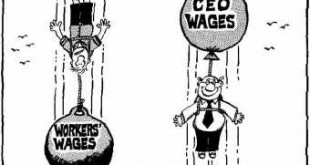Playing the blame game [embedded content] David Silvester, who resigned from the Conservative Party over David Cameron’s same-sex marriage policy, has said gay marriage is to blame for Britain’s recent spell of bad weather in a letter to The Henley Standard. He wrote: “Since the passage of the Marriage (Same Sex Couples) Act, the nation has been beset by serious storms and floods.” Huffington Post Thank God for all these intelligent and unprejudiced conservative politicians …...
Read More »What mainstream economists are embarrassed to admit
What mainstream economists are embarrassed to admit The true state of affairs is almost opposite of what Friedman makes it out to be when he ventures the opinion that “different predictions about the importance of so-called ‘economies of scale’ account very largely for divergent views about the desirability or necessity of detailed government regulation of industry and even of socialism rather than private enterprises.” Was there ever an economist who came to believe in either socialism or...
Read More »On the importance of blogging
On the importance of blogging
Read More »Thatcher and the neoliberal counterrevolution
The outstanding faults of the economic society in which we live are its failure to provide for full employment and its arbitrary and inequitable distribution of wealth and incomes … I believe that there is social and psychological justification for significant inequalities of income and wealth, but not for such large disparities as exist to-day. John Maynard Keynes wrote this in General Theory (1936). Four decades later the Iron Lady appeared in the Parliament with this gobsmacking...
Read More »Justified and Ancient
[embedded content]
Read More »Dansklektion
[embedded content]
Read More »RCT — no guide to the future
RCT — no guide to the future To see what RCTs show, let me define the Cartesian product of X2, X3, . . . , Xn by Z. What RCTs show is that there exists some z ∈ Z, such that if we have the world in state (x, z) ∈ X instead of (y, z) ∈ X, the world in the next period will be in state a ∈ X instead of state b ∈ X. This is like saying, other things being the same (that is, z), if you vaccinate people, in the next period, there will be no influenza. But if you do not vaccinate them, there will...
Read More »Labor-cost competitiveness and the Eurozone — a textbook fairytale
Labor-cost competitiveness and the Eurozone — a textbook fairytale Heiner Flassbeck and Costas Lapavitsas spell out their version of what is roughly the neoclassical textbook model of a currency union. Their main point is that there would not have been large unsustainable current account imbalances within the Eurozone, and consequently no sovereign debt crisis in the deficit countries, if all member states had kept their nominal wage growth equal to labor productivity growth plus 2% (the...
Read More »Randomness reexamined (wonkish)
If the centuries-old struggle with the problem of finding an analytical definition of probability has produced only endless controversies between the various doctrines, it is, in my opinion, because too little attention has been paid to the singular notion of random. For the dialectical root, in fact, lies in this notion: probability is only an arithmetical aspect of it. Nicholas Georgescu-Roegen Modern probabilistic econometrics relies on the notion of probability. To at all be amenable...
Read More »Economic rebellion
BBC report on the need for rethinking economics and the way we teach it.
Read More » Lars P. Syll
Lars P. Syll






